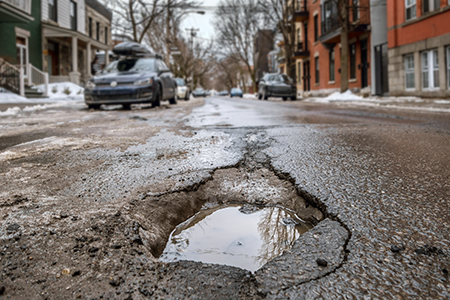Pothole damage: Claims and compensation

If a pothole has left your car damaged, you have options, but you’ll need to prove that the road maintenance authorities were negligent in doing their job.
A piece of advice: whether you’re making a claim against a municipality or the provincial government or taking your claim to court—and we recommend you do both at once—you’ll need to move quickly.
How long do I have to make a claim with regard to pothole damage?
You’ll need to move quickly: the window for making a claim is very small.
- For a claim against a municipality, written notice stating your intent to claim damages must be sent by registered mail to the clerk of the municipality where the pothole is located within 15 days of the incident.
- In addition to making a claim against the municipality, you can also demand financial compensation (i.e., sue for damages) within six months of the date of the incident.
- If you’re claiming $15,000 or less in damages, you must take your case to Small Claims Court. If the repair estimate is for more than $15,000, your case will be decided by a higher court.
- Claims against the Ministry of Transport fall under the Civil Code, which means the limitation period is three years. But since it can be difficult to prove the road was in poor shape years later, you should act as quickly as possible.

Under what conditions can I sue a municipality or the Ministry of Transport?
You cannot hold a municipality or the provincial government liable for material damage to your vehicle’s tires or suspension system due to road conditions.
That’s according to these laws:
- Roads managed and maintained by the Ministry of Transport of Quebec: Article 30, An Act Respecting Roads (CQLR chapter V-9)
- Municipality governed by the Municipal Code: Article 1127.2, Municipal Code of Québec, (CQLR chapter C-27.1)
- Municipality governed by the Cities and Towns Act: Article 604.1 of the Cities and Towns Act (CQLR chapter C-19)
Despite that legal restriction, you can still sue a municipality or the Quebec Ministry of Transport for carelessness, negligence, or misconduct. The burden of proof, however, rests with the driver (i.e., you).
How do I prove it was a case of carelessness, negligence, or misconduct?
To prove that the authority responsible for the road with the pothole was careless, negligent, or otherwise at fault, you have to demonstrate two things:
- That the pothole had already been reported to the authority before the incident, and
- That the authority failed to do anything about it.
What evidence will I need if I’m going to sue for damages?
The following pieces of evidence will help you with your case:
- Testimony from other drivers, residents, or nearby businesses attesting to the presence of a pothole
- The prior report made to the authority
- Lack of a warning sign
- Pictures of the pothole and surroundings
- The width and depth of the pothole
- An estimate of the necessary repairs
Municipalities and the various Ministry of Transport divisions have official complaint mechanisms, which means you can get a copy of the list of potholes reported for the period in question by submitting a request to the authority in question.
The repair estimate: a crucial piece of evidence for any claim or suit
It’s extremely important to have a repair estimate from a recognized repair shop, such as a CAA-Quebec Approved Auto Repair Service, when you make your claim. The legal exemptions of liability for municipalities and the provincial government (the laws that say they aren't responsible for vehicle damage) only apply to tires and suspension systems.
This means that even if you are unable to show to the judge’s satisfaction that tire or suspension damage was due to the relevant authority’s carelessness, negligence, or misconduct in maintaining the road, you could still be compensated for damage to a wheel rim, a wheel, steering components, etc. That’s how the law has been applied to date. Here are some examples of cases that have been heard:
Examples of cases that have been heard
Beaulieu c. Ville de Montréal (500-32-091070-054)
Plante c. Ville de Montréal (500-32-093719-054)
Harvey c. Ville de Montréal (500-32-091116-055)
Saillant c. Ville de Québec (200-32-041469-064)
St-Denis c. Ville de Sainte-Agathe-des-Monts (715-32-000163-069)
Lavallée c. Ville de Montréal (500-32-092285-057)
Gagnon c. Ville de Dolbeau-Mistassini (175-32-000074-065)
Caissy-Nantel c. Ville de Bonaventure (105-32-001376-086)
Rivest c. Municipalité de Sainte-Julienne (705-32-008488-055)
Dulude c. Ministère des Transports du Québec (500-32-060144-013)
Tellier c. Ville de Gatineau (550-32-009901-023)
Bréard c. Ville de Montréal (500-32-084489-048)
Fortin c. Ville de Saguenay (165-32-002043-044)
Heppel c. Ville de Saguenay (150-32-005006-040)
Goulet c. Ville de Chicoutimi (150-32-003623-010)
Ville de Montréal c. De Michele (500-17-027148-058) - Cour supérieure
Gravel c. Ville de Saguenay (150-32-007103-092)
Perron St-Laurent c. Municipalité de Berry (605-32-002416-104)
Ferme Meniel inc. c. ville de vaudreuil - Dorion (760-32-012585-081)
Alary c. Ville de Saint-Jérôme (700-32-020388-086)
You’ll find the rulings online at citoyens.soquij.qc.ca (under “Tribunal ou organisme,” select “Cour du Québec - Division des petites créances (CQ)” and enter “pothole” in the Mots clés field).
Is pothole damage covered by my auto insurance?
It could be. If it is, you’ll need to decide if it’s worth making a claim, given your deductible. Discuss it with your insurance advisor.
Note that if, after you start a claim and evaluate the costs, you decide not to claim the cost of repairs from your insurer, your claim will still appear in your FCSA file with the mention “closed without compensation.”

Benefit from personalized advice
Do you have questions about gas-powered or electric vehicles, driving, or need recommendations to find an Approved Auto Repair Service?